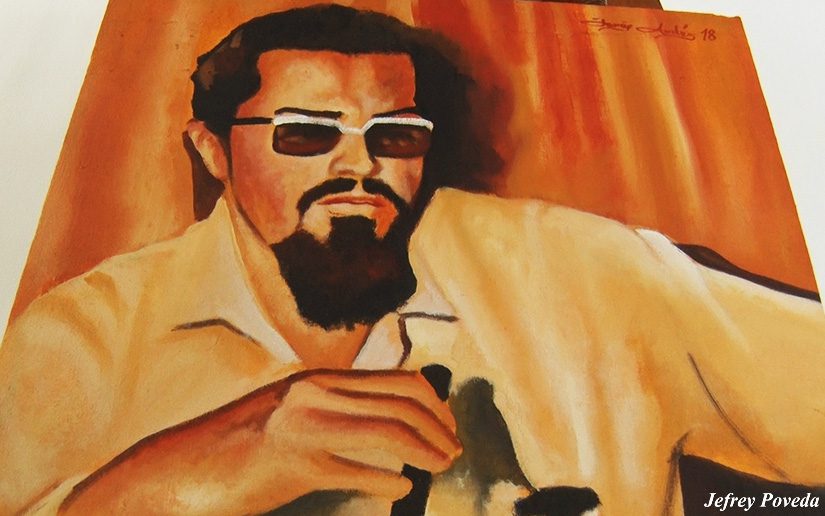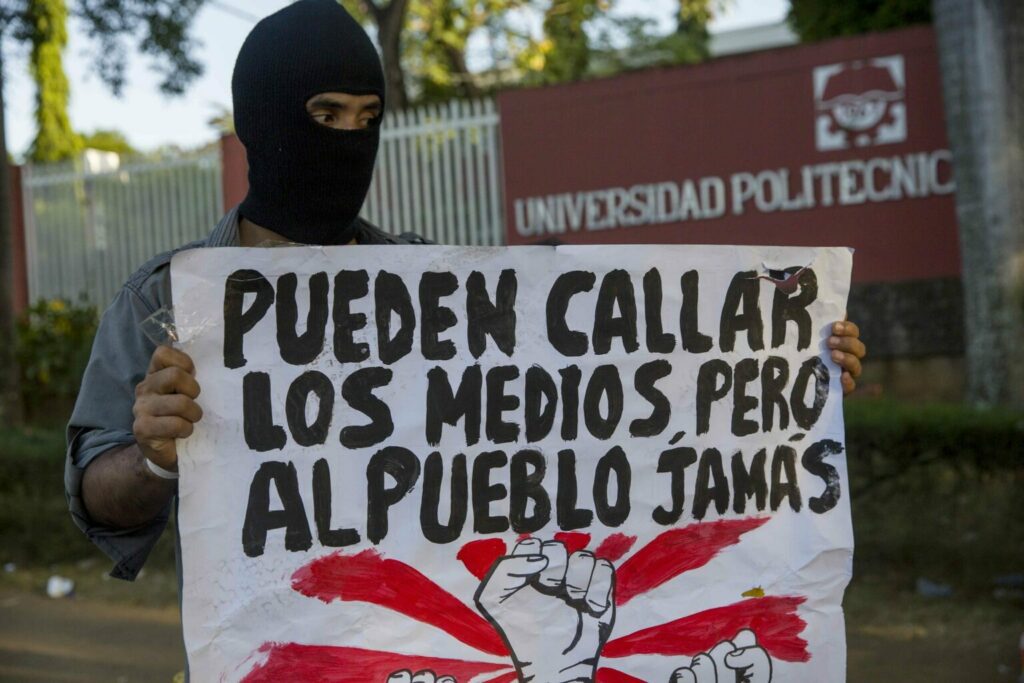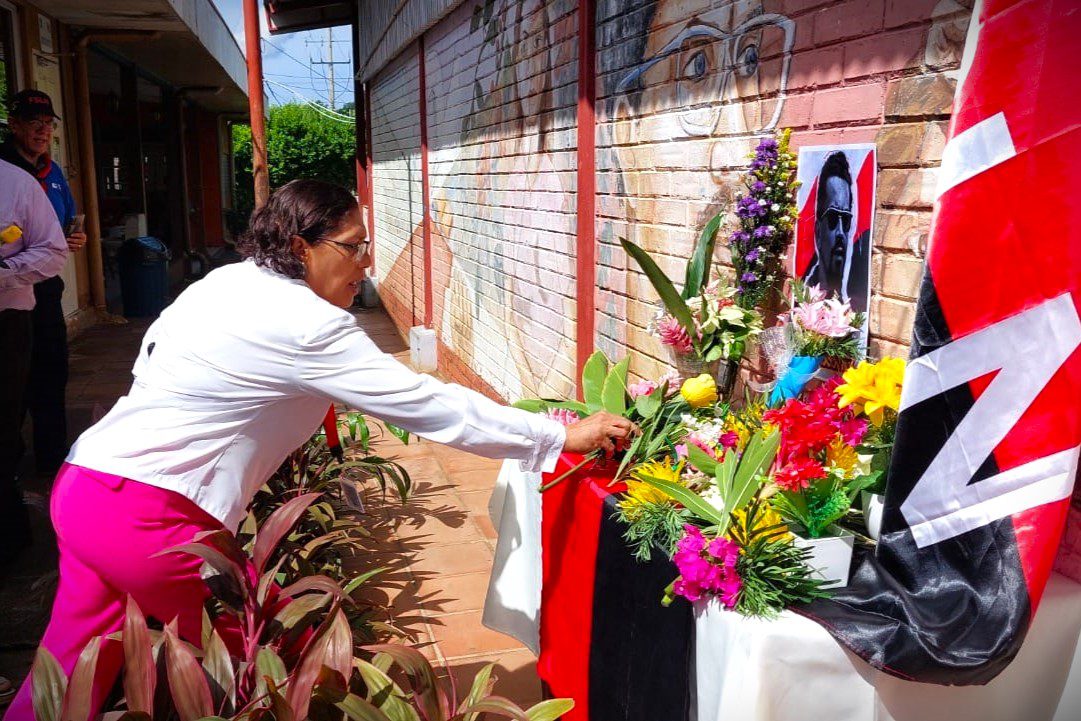While some activities are made voluntary, others are part of the mandatory tasks of the syllabus. The student life of former Polytechnic University of Nicaragua (Upoli) students, now called the National Polytechnic University (UNP), varies between carrying out activities with municipalities, teaching literacy in impoverished communities and painting murals of Carlos Fonseca, in celebration of the anniversary of the Sandinista revolution.
Among other activities, they must also design infographics on the life of Augusto César Sandino, the acclaimed icon of Orteguismo; research on “terrorism” in Nicaragua and list the progress the country has made under the Sandinista government.
Since the dictatorship of Daniel Ortega and Rosario Murillo cancelled Upoli’s legal status and took over campus administration in February 2022, studying at UNP means receiving political propaganda every day, says Cinthia, a third-year student who requested anonymity.
According to her, Design students are more likely to be elected for these Sandinista political activities.” We, the Design students, are the ones they mostly choose for these things. At least I haven’t heard students from other careers being offered the things they send us to do,” she says.
Recibe nuestro boletín semanal
Murals painted to glorify Sandinismo

In July of this year, different authorities of UNP came to the classrooms of the Integral Communication Design course to invite students to participate in the creation of a mural, but without specifying its content.
When the students arrived, they realized that it was a political activity commemorating the Sandinista revolution to paint the founder of the Sandinista Front, Carlos Fonseca Amador.
To the discomfort of many, the authorities directing the activity told them that it was voluntary. However, most of the students would have preferred to have been told in advance, says Cinthia.
Activities are part of the syllabus
Not all these activities are voluntary. Throughout 2022, the different generations of Integral Communication Design also had to carry out projects in conjunction with municipalities, as part of their academic work for the end of the semester.
When Upoli existed, the students had the option of choosing their project topics with total freedom. Now, with the UNP administration, students did not have this option. The new government authorities assigned class groups to work on the state project Ciudades Creativas (Creative Cities).
Creative Cities is a project that promotes entrepreneurship in Masaya, León, Granada, Estelí, Bluefields and San Juan de Oriente. In Cinthia‘s case, she worked with entrepreneurship in Masaya, while other groups worked in other departments and municipalities.
Her task was to create informational products about the “creative economy” promoted by the Ortega-Murillo regime as a solution to reduce poverty rates in the country, and to add the characteristic graphic elements of the Sandinista regime.
The creative economy project is administered by Camila Ortega Murillo, daughter of dictators Daniel Ortega and Rosario Murillo, who serves as “presidential advisor”. Its objective is supposedly to strengthen “knowledge management, entrepreneurship and innovation, which drives our creative economy model”.
However, the reality is that in Nicaragua the creative economy project is based on informal businesses lacking in technology.
At the end, infographics, brochures and banners about entrepreneurship were handed out by the students in another political activity with government flags and music. Participation was mandatory on this occasion.
Tasks with propagandistic intentions

Infographics and designs do not end there. This year, Cinthia and her classmates again had to make illustrations about the life and work of Augusto César Sandino. This assignment was part of their syllabus, although the topic had nothing to do with the class in question, nor was there any academic teaching involved.
These types of assignments with propagandistic intentions are increasingly common in classrooms, says Paula, another student at the Estelí campus of UNP. Among the assignments, a professor ordered law students to research “terrorist events” in Nicaragua, with special emphasis on 2018. While many tried to do the assignment as objectively as possible, the students’ discontent was evident.
In July of this year, they also invited the young people to participate in an extracurricular activity, but without specifying what it consisted of. When the students showed up for the activity, they realized that it was also an activity of the Sandinista Front to teach literacy in different communities.
The fear of political surveillance made many decide to participate in these activities and not show their nonconformity with new authorities.
“Now all the tasks and activities of the university are somehow related to the government. They tell you sometimes that you can opt out, but I don’t feel safe saying in front of everyone that I prefer not to participate, after they make us come to the place,” she says.
Scholarships have decreased under the regime’s administration
Now that Cinthia studies on Saturdays, she does not have to participate as frequently in government projects as she did on weekdays. However, by switching to Saturday classes she lost her scholarship, a limitation imposed by the UNP administration.
Before the Ortega-Murillo regime took over the university, Upoli offered its students the possibility of keeping their scholarships when they changed to another modality. This opportunity was completely eliminated last year.
“Before, there were more options to keep the scholarship. I have a classmate who switched to Saturdays when Upoli existed and kept her scholarship. There was a possibility of being awarded a Saturday scholarship, but now it is no longer possible”, she says.
UNEN controls scholarship allocation
In general, opportunities to obtain a scholarship at UNP have considerably decreased, says Cinthia, since the authorities respond to any scholarship application by saying that “the good government reduced the fees”, although this reduction only consisted of five dollars less for each class.
Now, in order to obtain a scholarship at UNP, students must have friends and contacts in the National Union of Students of Nicaragua (UNEN), which administers university scholarships.
“Before, it was easier to put in paperwork for scholarships. Now they just tell you ‘no, we’ve already lowered the fee’. Before, they could even exempt you from tuition if you wrote a letter. There are still some quotas, but only if you have friends in UNEN they give them to you”, she says.
The student body of confiscated universities has no choice but to abide by the guidelines provided by the ruling authorities. “We can’t complain, we can’t say no,” they say.

